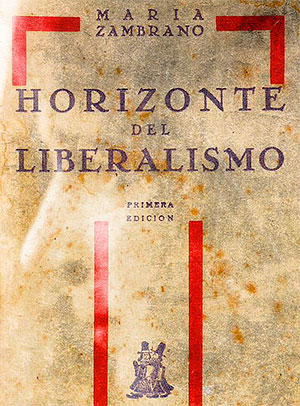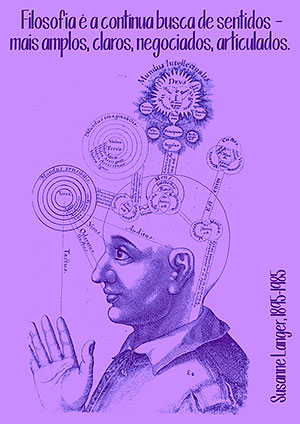Think
Why philosophy? Four women philosophers answer
Paloma Pérez-Ilzarbe, lecturer at the Degree at Philosophy of the School of Humanities and Social Sciences
of the University of Navarra, invites us to reflect on the importance of the Philosophy
through four great women philosophers who have marked 20th century thought.

The Philosophy is not fashionable (despite some optimistic voices proclaiming the contrary). I am not complaining: fashions pass and fame is not a commodity to be sought for its own sake. What worries me is that Philosophy does not seem to find an effective way to defend itself. We know that philosophising is important for life, but we do not manage to spread that conviction.
What does Philosophy have to do with life? Who should philosophise? What can Philosophy contribute to today's world? What is philosophical thinking for me? Four great European thinkers of the 20th century help us to find answers: the Malaga-born María Zambrano, the American Susanne Langer and the British Mary Midgley and Susan Stebbing. From their different specialities (metaphysics, art theory, ethics, logic), they share a broad vision of Philosophy and a clear idea of its importance.
María Zambrano (1904-1991): Philosophy puts a channel to life
The daughter of a teacher, Zambrano had the family Library Services at her disposal and received valuable encouragement to develop as a thinker. Among her father's friends she met Unamuno, with whom she glimpsed the limits of modern reason.
In her years at doctorate she discovered Ortega, of whom she considers herself a disciple. Political commitment and an intense intellectual life marked her youth. After the Spanish war, exile was her homeland (she used to say) for more than forty years.
|
|
|
Cover of Horizonte del Liberalismo, by María Zambrano. |
Zambrano's Philosophy is the result of the exercise of a non-systematic reason, a reason that thinks human life in a fertile play of light and shadow. poetic reason What does the Philosophy have to do with real life? Everything: the Philosophy is born of life, which wants to become visible (intelligible), which wants to express itself in words. That is why it must turn towards the life that has given rise to it.
To philosophise, according to Zambrano, is to build a path for life, a channel so that human time does not scatter without direction. Thinking allows us to know ourselves ("to think is to decipher what one feels") and Philosophy (in its many forms and over the centuries) has been ordering thinking. Without this order we would not be able to see the profound truths that give meaning to our lives.
Susanne Langer (1895-1985): we must cultivate our reason
|
|
|
Poster with a quotation of Susane Langer |
Susanne Langer is an American philosopher of German origin. From her father she inherited a talent for music (as a child she played the piano and later the cello) and from her mother a love of words (Langer's first publication was a book of children's stories).
Although he began his degree program in the field of logic (with Whitehead and Sheffer), his interest in the study of symbols broadened his thinking towards the Philosophy of art and that of the mind. In Philosophy in a New Key the musical metaphor he reveals the idea that philosophising must adapt to the moment with new concepts that transform the way we think about the world.
For Langer, going to Philosophy means stretching the limits of thought: creating new ideas with which to shape our ever new experience. Discovering meaning, constructing an order that illuminates the unseen. Novelty comes from genius (a peculiar combination of imagination and logic), but Philosophy is not exclusive to genius minds.
Who should philosophise? Anyone with a clear head. Langer's defence of Philosophy takes the form of an apology for Education as the cultivation of reason. Let us not just train specialists in practical problems, let us train people who understand the world in which they live: if we do not take care of reason we will not be able to think our lives through.
Mary Midgley (1919-2018): to philosophise is to unblock the thought.

"Mary Midgley zwischen James Lovelock und Richard Mabey" by Jon Edgar. CC BY 3.0. See source
This great visionary of the challenges of today's world (our relationship with animals, climate change, the trans-human future) coincided at Oxford with the also great Anscombe, Foot and Murdoch, with whom she formed a fruitful philosophical "quartet".
Like them, he developed an original and sincere way of thinking, far removed from the dominant style of discussion in the analytical Philosophy of the time. Without having finished her doctoral dissertation, Midgley left the philosophical profession to devote herself to caring for her family. She published the books that have made her famous as a mature philosopher, already outside the academic circuits.
What can philosophical thinking contribute to today's world? The Philosophy is not an extra, but a basic necessity. Human life (in our current sophisticated culture) hides a complex network of concepts that require specialists, just as our subsoil hides a network of pipes that require specialised maintenance. When that infrastructure does not work well, thinking becomes clogged and life can go to waste.
Beware: the specialised Philosophy that Midgley advocates (his 'philosophical plumbing') is not that of the narrow technical discussions towards which our profession is now tending. The great task of Philosophy is to pay attention to thought as a whole, to look at it in a broad perspective and to make connections between different ways of thinking.
The need to explicitly formulate the conceptual threads that so easily get tangled up in thinking about human life (determination or freedom?, nature or culture?, mind or subject?) is what makes Philosophy as indispensable to Midgley as food or shelter.

Susan Stebbing (1885-1943): the importance of pausing for thought
Stebbing was the first woman to get a Chair from Philosophy at a British university. A contemporary of the great analytic philosophers and an enthusiastic witness to the birth of the new mathematical logic, her greatest intellectual influence was that of G. E. Moore, from whom she learned that clarity must be the main virtue of philosophical speech .
The terrible experience of two world wars left her with the pain of a collective failure for which she felt, as an individual, manager: guilty of not having contributed enough to formulating precise questions and seeking real answers about what is worth pursuing.
For Stebbing, the mission statement of the Philosophy is to put into words what we somehow perceive without being able to communicate clearly. What use is philosophical thinking to me?
At Thinking to Some Purpose Stebbing urges Philosophy to take contact with life. This entertaining guide of applied logic is also, at its heart, a defence of true philosophising: Socratically, it reminds us how important it is for every human being to stop and think before acting.
Ask and seek answers: invent questions that we would never have asked if we had not explicitly stated the problem; in answering, clarify and define our ideas. "Be definite!"is the committee Stebbing offers to concrete people who, in concrete situations, have to deal with concrete problems. Define yourself, don't be moved by abstract ideas. If you want to change the world, stop and think.
Wait! If you are interested in learning more about these issues, we recommend these readings
→ De Zambrano: "Why write".
→ De Langer: "Why Philosophy?"
→ De Midgley: "Philosophical Plumbing".
→ From Stebbing: "Thinking and Doing", chapter II of Thinking to Some Purpose.
→ About Zambrano: Biography (by the Glosario María Zambrano team)
→ About Langer: Susanne K. Langer (by Donald Dryden)
→ About Midgley: Mary Midgley (by Nat Dyer)
→ About Stebbing: L. Susan Stebbing (by Siobhan Chapman)








